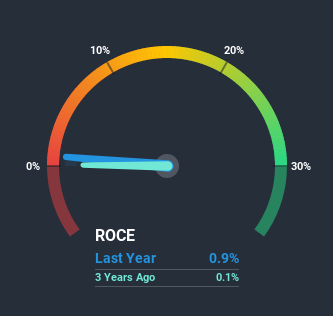- India
- /
- Food and Staples Retail
- /
- NSEI:RUCHINFRA
Ruchi Infrastructure (NSE:RUCHINFRA) Could Be At Risk Of Shrinking As A Company
When researching a stock for investment, what can tell us that the company is in decline? When we see a declining return on capital employed (ROCE) in conjunction with a declining base of capital employed, that's often how a mature business shows signs of aging. This combination can tell you that not only is the company investing less, it's earning less on what it does invest. So after we looked into Ruchi Infrastructure (NSE:RUCHINFRA), the trends above didn't look too great.
What is Return On Capital Employed (ROCE)?
If you haven't worked with ROCE before, it measures the 'return' (pre-tax profit) a company generates from capital employed in its business. The formula for this calculation on Ruchi Infrastructure is:
Return on Capital Employed = Earnings Before Interest and Tax (EBIT) ÷ (Total Assets - Current Liabilities)
0.0086 = ₹23m ÷ (₹3.8b - ₹1.1b) (Based on the trailing twelve months to December 2020).
Thus, Ruchi Infrastructure has an ROCE of 0.9%. In absolute terms, that's a low return and it also under-performs the Consumer Retailing industry average of 10%.
Check out our latest analysis for Ruchi Infrastructure

While the past is not representative of the future, it can be helpful to know how a company has performed historically, which is why we have this chart above. If you'd like to look at how Ruchi Infrastructure has performed in the past in other metrics, you can view this free graph of past earnings, revenue and cash flow.
How Are Returns Trending?
In terms of Ruchi Infrastructure's historical ROCE movements, the trend doesn't inspire confidence. To be more specific, the ROCE was 11% five years ago, but since then it has dropped noticeably. And on the capital employed front, the business is utilizing roughly the same amount of capital as it was back then. Companies that exhibit these attributes tend to not be shrinking, but they can be mature and facing pressure on their margins from competition. If these trends continue, we wouldn't expect Ruchi Infrastructure to turn into a multi-bagger.
On a related note, Ruchi Infrastructure has decreased its current liabilities to 29% of total assets. So we could link some of this to the decrease in ROCE. What's more, this can reduce some aspects of risk to the business because now the company's suppliers or short-term creditors are funding less of its operations. Some would claim this reduces the business' efficiency at generating ROCE since it is now funding more of the operations with its own money.
In Conclusion...
In summary, it's unfortunate that Ruchi Infrastructure is generating lower returns from the same amount of capital. Long term shareholders who've owned the stock over the last five years have experienced a 11% depreciation in their investment, so it appears the market might not like these trends either. That being the case, unless the underlying trends revert to a more positive trajectory, we'd consider looking elsewhere.
If you'd like to know more about Ruchi Infrastructure, we've spotted 4 warning signs, and 2 of them make us uncomfortable.
While Ruchi Infrastructure may not currently earn the highest returns, we've compiled a list of companies that currently earn more than 25% return on equity. Check out this free list here.
When trading Ruchi Infrastructure or any other investment, use the platform considered by many to be the Professional's Gateway to the Worlds Market, Interactive Brokers. You get the lowest-cost* trading on stocks, options, futures, forex, bonds and funds worldwide from a single integrated account. Promoted
New: AI Stock Screener & Alerts
Our new AI Stock Screener scans the market every day to uncover opportunities.
• Dividend Powerhouses (3%+ Yield)
• Undervalued Small Caps with Insider Buying
• High growth Tech and AI Companies
Or build your own from over 50 metrics.
This article by Simply Wall St is general in nature. It does not constitute a recommendation to buy or sell any stock, and does not take account of your objectives, or your financial situation. We aim to bring you long-term focused analysis driven by fundamental data. Note that our analysis may not factor in the latest price-sensitive company announcements or qualitative material. Simply Wall St has no position in any stocks mentioned.
*Interactive Brokers Rated Lowest Cost Broker by StockBrokers.com Annual Online Review 2020
Have feedback on this article? Concerned about the content? Get in touch with us directly. Alternatively, email editorial-team (at) simplywallst.com.
About NSEI:RUCHINFRA
Adequate balance sheet and slightly overvalued.
Market Insights
Community Narratives



